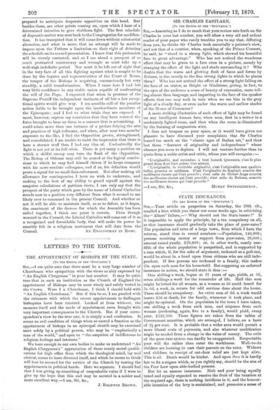SIR CHARLES EASTLAKE.
(TO THE EDITOR OF THE SPECTATOR.")
SIR,—Assenting as I do to much that your review sets forth on Sir Charles in your last number, you will allow a very old and ardent
reader of your paper who rarely troubles you to say that, differing from you, he thinks Sir Charles took essentially a painter's view, and not that of a courtier, when, speaking of the Prince Consort, he said, he "stood in a strong light, which showed his beautiful face to great advantage." Who has not noticed the wondrous effect that may be given to a face even in a picture, merely by changing the effect of the light and shade surrounding it ? Who doubts that the warm and glowing flesh of faces and forms by Rubens, is due mostly to the fine strong lights in which he places them? Who has not noticed the effect of a strong light falling on the face of an orator, as Bright or Gladstone, giving, in fact, to the eyes of the audience a sense of beauty of expression, more tell- ing almost than language, and imparting to the face of the speaker effects that one may seek in vain when we see him in the grey light of a cloudy day, or even under the warm and mellow shades of the House of Commons ?
A more striking illustration of such effect of light may be found on any intelligent human face, when seen, first in a mirror in a moderately lighted room, and then when the room is illuminated by the burning of magnesium wire.
I dare not trespass on your space, or it would have given me pleasure to have discussed your complaints that Sir Charles leaned too much on the " classic ages of Italian art," and thus lost those " features of originality and independence" whose absence you seem to deplore. I will not venture further than to quote from a noble artist and critic, whom you will recognize :—
"L'originalite, mal entondue, a tout basard, ignorante, c'est le plus grand flean dont l'art puisso etre atteint.
" L'originalite, is veritable originalite, c'est I'originalite aux qualites belles, grandos et sublimes. C'est l'originalite de Raphael, nourrie des meilleures choses qui rout precede ; c'est cella de Michel-Ange nourrie dos meilleures choses qui l'ont precede ; c'est cello de Rubens, nourrie des meilleures choses qui Pont precede."


































 Previous page
Previous page